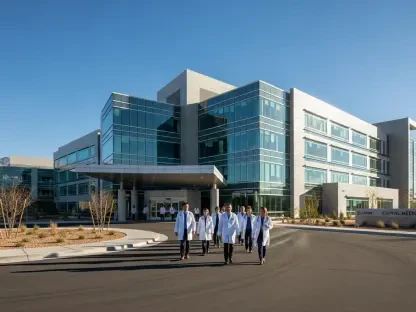The Royal Marsden, a specialist cancer center in the UK, has been at the forefront of cancer treatment and research since its founding in 1851. Known for its pioneering work, the center has grown to be one of the top four cancer centers worldwide in terms of research impact. Operating from four locations in London—Chelsea, Sutton, Kingston, and a private care site in Cavendish Square—the center sees around 60,000 NHS and private patients annually. This article explores how The Royal Marsden revolutionizes cancer care and research through innovative treatments, advanced technology, and a patient-centered approach.
Commitment to Exceptional Patient Care
Innovative Treatments and Advanced Technology
The Royal Marsden is committed to delivering exceptional patient care through innovative treatments and advanced technology. The center was the first in the UK to adopt the advanced ‘daVinci Xi and S’ surgical systems, significantly improving surgical precision and patient outcomes. The adoption of these advanced surgical systems has allowed surgeons to perform complex procedures with enhanced precision, reducing recovery times and minimizing the risk of complications. These advancements represent a significant breakthrough in surgical oncology, offering patients better chances of successful outcomes.
Additionally, The Royal Marsden houses one of the UK’s largest radiotherapy departments, administering over 75,000 treatments annually using state-of-the-art equipment like MR Linac and Cyberknife. The MR Linac allows for highly accurate imaging during radiation therapy, enabling precise targeting of tumors while sparing surrounding healthy tissue. Cyberknife, another advanced radiotherapy system, delivers high doses of radiation with pinpoint accuracy, making it possible to treat tumors that were previously considered inoperable. These cutting-edge technologies ensure that patients receive the best possible care, with treatments tailored to their specific needs and conditions.
Enhancing Patient Experience
Private patients, particularly at the Sutton location, benefit from hotel-style services, private patient wards with ensuite bathrooms, and dedicated outpatient facilities. These amenities ensure that the care experience is not only medically effective but also comfortable and supportive for both patients and their families. The emphasis on patient comfort is a key aspect of The Royal Marsden’s approach, recognizing that a positive and reassuring environment can significantly impact the overall treatment experience and patient outcomes.
The construction of a new Medical Day Unit (MDU) in Sutton, slated for completion in spring 2025, further demonstrates The Royal Marsden’s commitment to enhancing the patient experience. This new unit promises a high standard of comfort, privacy, and convenience for private patients. Christian Rowley, the Associate Director of Operations, highlights that the modern, light-filled design of the MDU will set a high bar for patient care, emphasizing the benefits of integrating services in a cohesive and accessible environment. The new MDU will offer an array of services, from chemotherapy and other infusions to consultations and supportive therapies, all under one roof, thereby enhancing patient convenience and care outcomes.
Specialized Multidisciplinary Team
Comprehensive, Personalized Treatment Plans
The Royal Marsden’s patient-centered approach is underscored by its dedicated multidisciplinary team of 35 cancer specialists. Each of these experts focuses on specific types of cancer, including but not limited to breast, gastrointestinal, haemato-oncology, urology, and gynecology. This specialization allows the team to develop comprehensive, personalized treatment plans for each patient. By bringing together experts from various fields, The Royal Marsden ensures that patients receive a well-rounded and thorough evaluation of their condition, leading to more effective and targeted treatment strategies.
Professor Chris Nutting, a consultant clinical oncologist, highlights that the high medical standards at The Royal Marsden Private Care in Sutton ensure that the care there is on par with the best available in central London, yet more easily accessible for patients in Surrey and the southeast of England. This approach not only provides patients with the latest advancements in cancer treatment but also ensures that they have access to state-of-the-art care without having to travel long distances. The team’s ability to collaborate closely and share their expertise enhances the overall quality of care and supports better patient outcomes.
Research-Led Treatment Approach
A standout element of The Royal Marsden’s appeal is its research-led treatment approach. The institution is globally recognized for its impactful research, constantly advancing the understanding and treatment of cancer. This research focus ensures that patients receive pioneering, targeted treatments from a team of renowned specialists. The Royal Marsden’s collaboration with the Institute of Cancer Research plays a crucial role in driving these innovations, as it allows for the seamless integration of research findings into clinical practice.
Recent studies, such as the PACE B trial led by Professor Nicholas van As, are a testament to this. The trial found that treatment duration for some prostate cancer patients could be reduced by 75% without compromising effectiveness, revolutionizing treatment protocols for these patients. By shortening treatment times while maintaining efficacy, The Royal Marsden is able to improve the patient experience and reduce the burden of treatment, making the process more manageable for patients. This commitment to research-driven care not only enhances treatment options but also contributes to the global body of knowledge on cancer, paving the way for future advancements.
Genomics Testing and Personalized Medicine
Targeted and Tailored Approach
Genomics testing is pivotal at The Royal Marsden, enabling a targeted and tailored approach to cancer treatment. This cutting-edge approach allows for the identification of specific genetic mutations and alterations within tumors, leading to highly personalized treatment plans. The Private Care division employs the latest genomics testing technologies to identify genetic changes in individual cancers, resulting in highly personalized, precision treatments. This level of customization ensures that patients receive therapies that are most likely to be effective based on their unique genetic profiles, improving outcomes and minimizing side effects.
Their specialist genomics laboratory, situated in Sutton, acts as a ‘one-stop-shop’ by combining clinical genomics and cellular pathology, enhancing patient convenience and care outcomes. This integration of services streamlines the diagnostic process, allowing for faster and more accurate identification of genetic abnormalities. By leveraging genomic data, The Royal Marsden can tailor treatments to the individual’s specific needs, offering a level of precision that was previously unattainable. This targeted approach not only improves the effectiveness of treatments but also opens up new possibilities for patients with rare or hard-to-treat cancers.
Enhancing Patient Convenience and Care Outcomes
The Royal Marsden, a renowned cancer center in the UK, has been leading the way in cancer treatment and research since its establishment in 1851. Famous for its groundbreaking work, it has become one of the top four cancer centers globally in terms of research impact. The Royal Marsden operates from four locations in London—Chelsea, Sutton, Kingston, and a private care site in Cavendish Square—serving approximately 60,000 NHS and private patients each year. This esteemed institution is celebrated for its innovative treatments, cutting-edge technology, and a patient-centered approach to care. The Royal Marsden’s commitment to revolutionizing cancer treatment is evident through its continuous advancements in medical procedures and thorough research efforts. The center’s emphasis on patient care ensures that each individual receives personalized treatment plans informed by the latest scientific discoveries, making it a beacon of hope and progress in the fight against cancer.









